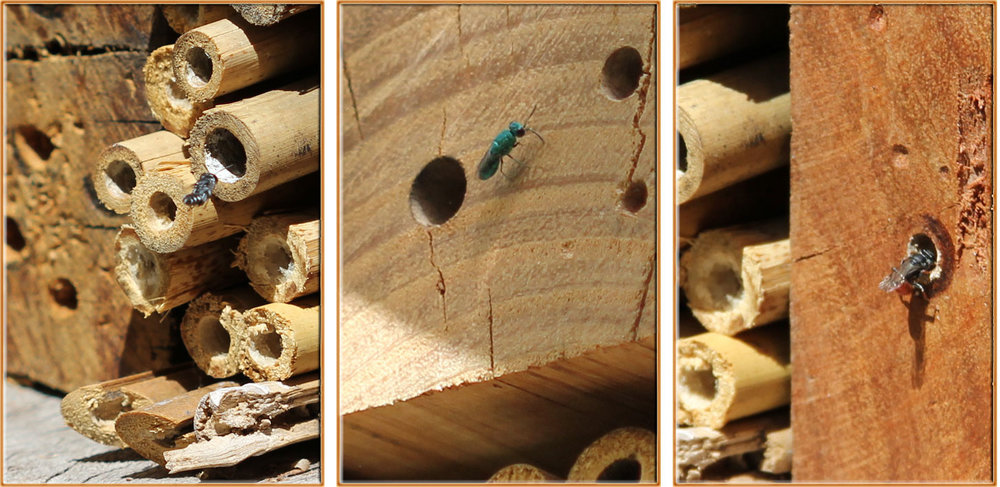Common queries about our bee (insect) hotels
/There are a number of questions and comments that often come up when discussing of the idea of a bee or insect hotel. There are lots of places to find these types of responses elsewhere online, but as a reader of this blog, you might not (yet!) be frequenting some of those sites. I'm only an enthusiast, so be sure to check out the links in previous posts (here and here), if you're keen to find out more.
Q: What if other species, like wasps or spiders, take up residence in the bee hotel or your garden?
A: We'd be thrilled! After all, even if you don't "like" wasps and spiders, they play a crucial role in the ecosystem - in terms of what they predate on and what they are food for, particularly. We might think we'd like to live in a world without spiders (well, actually not me, even though I have a very healthy respect for them; but I think many people would consider it a great option). But then we'd complain about all the flies or the lack of birds (that relied on them as food) and so forth.
We're up for encouraging as much insect diversity in our garden as we can, because it provides resilience and helps ensure a balance between all the functions. Many of our 'pest' species are only pests because we humans created the conditions that enabled them to become so and in turn out-compete the local species. Be that through introducing species with no natural predators, destroying native habitat, the flow-on effects of losing species elsewhere in the ecological web, reduced food sources, poisoning them ('good guys' die if we spray, even when the intention is to get rid of the 'bad guys') and so on.
Sure, we'll discourage spiders from taking over the insect hotel (but creating special habitat for them is a great alternative). And there are some wasps we're not very fond of, because they are aggressive. For example, European wasps and paper wasps. But the insect hotel doesn't provide the sort of homes those guys like, so it's not encouraging them as such.

Photos: Even though these visitors to the 'hotel' appear to be solitary wasps, I don't mind!
Q: Can you harvest honey from native bees (or your bee hotel)?
A: No, the bees we're aiming to encourage are solitary. Generally each female will nest in her own tunnel or hole. They build a nest, lay eggs and leave food (nectar, pollen) for the young before sealing the hole. If you fancied trying to extract their food from their nests it might be less than a gram at a time, not the potentially kilograms of honey per frame that honeybee keepers get from a hive. Having said that, being solitary doesn't necessarily mean they want to live in isolation - hence they can be happy to nest in holes near others of their own or other species. With 1,500 plus species of Australian native bee, it's not surprising to learn there can be quite a bit of variation between their nesting preferences, mating habits, extent they work together and so forth.
There are some species of native bee that are social. That is, they live in a colony and co-operate like honeybees do. Unfortunately, our climate is too cold in winter to sustain them (without artificial heat) so keeping those is generally done by people living further north in Australia. They seem to be increasing in popularity to keep and also have featured in some mainstream media like gardening programs (Costa's got some) and magazines.
Q: Do native bees sting?
A: Some do and some don't. But a sting is pretty unlikely as they'll only sting in defence. If you're flat out spotting them in the garden (and I hope you are looking out for them!), then you're not likely to accidentally step on or grab one.


